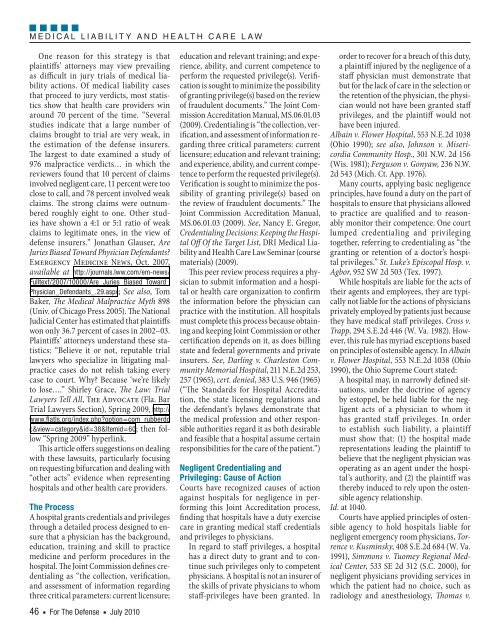For The Defense, July 2010 - DRI Today
For The Defense, July 2010 - DRI Today
For The Defense, July 2010 - DRI Today
- No tags were found...
You also want an ePaper? Increase the reach of your titles
YUMPU automatically turns print PDFs into web optimized ePapers that Google loves.
M E D I C A L L I A B I L I T Y A N D H E A LT H C A R E L A WOne reason for this strategy is thatplaintiffs’ attorneys may view prevailingas difficult in jury trials of medical liabilityactions. Of medical liability casesthat proceed to jury verdicts, most statisticsshow that health care providers winaround 70 percent of the time. “Severalstudies indicate that a large number ofclaims brought to trial are very weak, inthe estimation of the defense insurers.<strong>The</strong> largest to date examined a study of976 malpractice verdicts… in which thereviewers found that 10 percent of claimsinvolved negligent care, 11 percent were tooclose to call, and 78 percent involved weakclaims. <strong>The</strong> strong claims were outnumberedroughly eight to one. Other studieshave shown a 4:1 or 5:1 ratio of weakclaims to legitimate ones, in the view ofdefense insurers.” Jonathan Glauser, AreJuries Biased Toward Physician Defendants?Emergency Medicine News, Oct. 2007,available at http://journals.lww.com/em-news/Fulltext/2007/10000/Are_Juries_Biased_Toward_Physician_Defendants_.29.aspx; See also, TomBaker, <strong>The</strong> Medical Malpractice Myth 898(Univ. of Chicago Press 2005). <strong>The</strong> NationalJudicial Center has estimated that plaintiffswon only 36.7 percent of cases in 2002–03.Plaintiffs’ attorneys understand these statistics:“Believe it or not, reputable triallawyers who specialize in litigating malpracticecases do not relish taking everycase to court. Why? Because ‘we’re likelyto lose….” Shirley Grace, <strong>The</strong> Law: TrialLawyers Tell All, <strong>The</strong> Advocate (Fla. BarTrial Lawyers Section), Spring 2009, http://www.flatls.org/index.php?option=com_rubberdoc&view=category&id=38&Itemid=60; then follow“Spring 2009” hyperlink.This article offers suggestions on dealingwith these lawsuits, particularly focusingon requesting bifurcation and dealing with“other acts” evidence when representinghospitals and other health care providers.<strong>The</strong> ProcessA hospital grants credentials and privilegesthrough a detailed process designed to ensurethat a physician has the background,education, training and skill to practicemedicine and perform procedures in thehospital. <strong>The</strong> Joint Commission defines credentialingas “the collection, verification,and assessment of information regardingthree critical parameters: current licensure;46 n <strong>For</strong> <strong>The</strong> <strong>Defense</strong> n <strong>July</strong> <strong>2010</strong>education and relevant training; and experience,ability, and current competence toperform the requested privilege(s). Verificationis sought to minimize the possibilityof granting privilege(s) based on the reviewof fraudulent documents.” <strong>The</strong> Joint CommissionAccreditation Manual, MS.06.01.03(2009). Credentialing is “the collection, verification,and assessment of information regardingthree critical parameters: currentlicensure; education and relevant training;and experience, ability, and current competenceto perform the requested privilege(s).Verification is sought to minimize the possibilityof granting privilege(s) based onthe review of fraudulent documents.” <strong>The</strong>Joint Commission Accreditation Manual,MS.06.01.03 (2009). See, Nancy E. Gregor,Credentialing Decisions: Keeping the HospitalOff Of the Target List, <strong>DRI</strong> Medical Liabilityand Health Care Law Seminar (coursematerials) (2009).This peer review process requires a physicianto submit information and a hospitalor health care organization to confirmthe information before the physician canpractice with the institution. All hospitalsmust complete this process because obtainingand keeping Joint Commission or othercertification depends on it, as does billingstate and federal governments and privateinsurers. See, Darling v. Charleston CommunityMemorial Hospital, 211 N.E.2d 253,257 (1965), cert. denied, 383 U.S. 946 (1965)(“<strong>The</strong> Standards for Hospital Accreditation,the state licensing regulations andthe defendant’s bylaws demonstrate thatthe medical profession and other responsibleauthorities regard it as both desirableand feasible that a hospital assume certainresponsibilities for the care of the patient.”)Negligent Credentialing andPrivileging: Cause of ActionCourts have recognized causes of actionagainst hospitals for negligence in performingthis Joint Accreditation process,finding that hospitals have a duty exercisecare in granting medical staff credentialsand privileges to physicians.In regard to staff privileges, a hospitalhas a direct duty to grant and to continuesuch privileges only to competentphysicians. A hospital is not an insurer ofthe skills of private physicians to whomstaff- privileges have been granted. Inorder to recover for a breach of this duty,a plaintiff injured by the negligence of astaff physician must demonstrate thatbut for the lack of care in the selection orthe retention of the physician, the physicianwould not have been granted staffprivileges, and the plaintiff would nothave been injured.Albain v. Flower Hospital, 553 N.E.2d 1038(Ohio 1990); see also, Johnson v. MisericordiaCommunity Hosp., 301 N.W. 2d 156(Wis. 1981); Ferguson v. Gonyaw, 236 N.W.2d 543 (Mich. Ct. App. 1976).Many courts, applying basic negligenceprinciples, have found a duty on the part ofhospitals to ensure that physicians allowedto practice are qualified and to reasonablymonitor their competence. One courtlumped credentialing and privilegingtogether, referring to credentialing as “thegranting or retention of a doctor’s hospitalprivileges.” St. Luke’s Episcopal Hosp. v.Agbor, 952 SW 2d 503 (Tex. 1997).While hospitals are liable for the acts oftheir agents and employees, they are typicallynot liable for the actions of physiciansprivately employed by patients just becausethey have medical staff privileges. Cross v.Trapp, 294 S.E.2d 446 (W. Va. 1982). However,this rule has myriad exceptions basedon principles of ostensible agency. In Albainv. Flower Hospital, 553 N.E.2d 1038 (Ohio1990), the Ohio Supreme Court stated:A hospital may, in narrowly defined situations,under the doctrine of agencyby estoppel, be held liable for the negligentacts of a physician to whom ithas granted staff privileges. In orderto establish such liability, a plaintiffmust show that: (1) the hospital maderepresentations leading the plaintiff tobelieve that the negligent physician wasoperating as an agent under the hospital’sauthority, and (2) the plaintiff wasthereby induced to rely upon the ostensibleagency relationship.Id. at 1040.Courts have applied principles of ostensibleagency to hold hospitals liable fornegligent emergency room physicians, Torrencev. Kusminsky, 408 S.E.2d 684 (W. Va.1991), Simmons v. Tuomey Regional MedicalCenter, 533 SE 2d 312 (S.C. 2000), fornegligent physicians providing services inwhich the patient had no choice, such asradiology and anesthesiology, Thomas v.
















